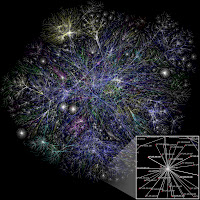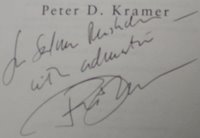
We say that inseparable quantum interconnectedness of the whole universe is the fundamental reality, and that relatively independent behaving parts are merely particular and contingent forms within this whole.The cover article of this week's Economist "When Everything Connects" concerns the coming wireless revolution, and how not just our phones and computers connect, but how everything will soon be connected - our fridges, our cars, our toaster, our fire alarms ... paint, that can of baked beans in the back of your cupboard - everything.
- David Bohm
The thing I hope this connectivity helps us to realize is - everything already is and always has been connected. (Without waxing too pretentious, that's the loose excuse of a theme for this blog: hitched to everything.) If we're lucky, if we don't stay blind to the fact, maybe these technological advances can serve as visible metaphors for the fact that everything in the universe acts and interacts with every other thing. Furthermore, the differences we perceive among ourselves are astonishingly superficial, when you remember that we're all composed of the swarming collection of atoms, that each of our bodies contains atoms from an extraordinarily array of objects, creatures and people, which preceded us.
Some people worry that science is sapping our lives of mystery, and that only religion can offer us meaning, prevent us from all flying apart at the seams morally and devolving into savages. Nonsense. The truth is, understanding the nature of the universe, our connectivity within that universe, and the presumed rarity of consciousness within it should only help us better understand our need to get along, to overlook our trivial differences.
Because here is what we know: we each are all minuscule portions of the universe, asleep for eons, now awakened, consciousness. We are the universe considering itself.
When you understand that, how can fail to find life and consciousness especially precious - in whatever its form?


